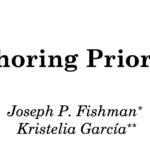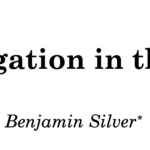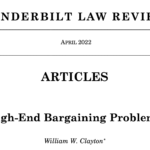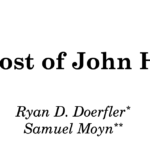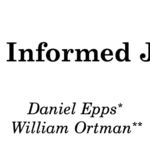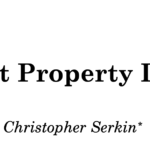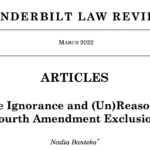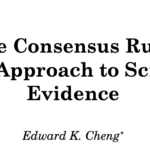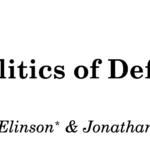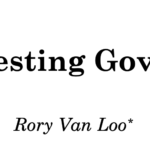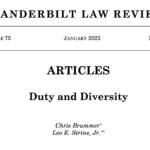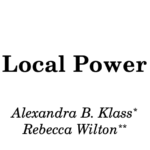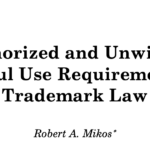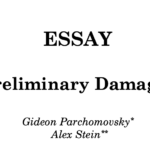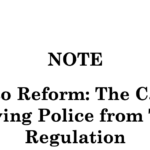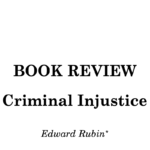Articles Category
Authoring Prior Art
May. 18, 2022—Joseph P. Fishman & Kristelia García | 75 Vand. L. Rev. 1159 (2022) | Patent law and copyright law are widely understood to diverge in how they approach prior art, the universe of information that already existed before a particular innovation’s development. For patents, prior art is paramount. An invention can’t be patented unless it is...
Nondelegation in the States
May. 18, 2022—Benjamin Silver | 75 Vand. L. Rev. 1211 (2022) | American public law is on the precipice of a nondelegation revival. Yet scholars have largely ignored the greatest wellspring of American nondelegation law: that of the states. As a result, the nondelegation literature is badly in need of a broad and deep examination of state nondelegation....
High-End Bargaining Problems
Apr. 21, 2022—William W. Clayton | 75 Vand. L. Rev. 703 (2022) | Many important areas of the law place great confidence in the ability of contracting parties to bargain effectively. In this Article, I question the wisdom of a formalistic faith in bargaining by identifying flaws in the bargaining process at the high end of the market,...
The Ghost of John Hart Ely
Apr. 21, 2022—Ryan D. Doerfler & Samuel Moyn | 75 Vand. L. Rev. 769 (2022) | The ghost of John Hart Ely haunts the American liberal constitutional imagination. Despite the failure long ago of any progressive constitutional vision in an increasingly conservative Supreme Court, Ely’s conjectures about the superiority of judges relative to legislatures in the protection of...
The Informed Jury
Apr. 21, 2022—Daniel Epps & William Ortman | 75 Vand. L. Rev. 823 (2022) | The right to a criminal jury trial is a constitutional disappointment. Cases almost never make it to a jury because of plea bargaining. In the few cases that do, the jury is relegated to a narrow factfinding role that denies it normative voice...
What Property Does
Apr. 21, 2022—Christopher Serkin | 75 Vand. L. Rev. 891 (2022) | For centuries, scholars have wrestled with seemingly intractable problems about the nature of property. This Article offers a different approach. Instead of asking what property is, it asks what property does. And it argues that property protects people’s reliance on resources by moderating the pace of...
Police Ignorance and (Un)Reasonable Fourth Amendment Exclusion
Mar. 22, 2022—Nadia Banteka | 75 Vand. L. Rev. 365 (2022) | The Fourth Amendment exclusion doctrine is as baffling as it is ubiquitous. Although courts rely on it every day to decide Fourth Amendment violations as well as defendants’ motions to suppress evidence obtained through these violations, virtually every aspect of the doctrine is a subject of...
The Consensus Rule: A New Approach to Scientific Evidence
Mar. 22, 2022—Edward K. Cheng | 75 Vand. L. Rev. 407 (2022) | Founded on good intentions but unrealistic expectations, the dominant Daubert framework for handling expert and scientific evidence should be scrapped. Daubert asks judges and jurors to make substantively expert determinations, a task they are epistemically incompetent to perform as laypersons. As an alternative, this Article...
The Politics of Deference
Mar. 22, 2022—Gregory A. Elinson & Jonathan S. Gould | 75 Vand. L. Rev. 475 (2022) | Like so much else in our politics, the administrative state is fiercely contested. Conservatives decry its legitimacy and seek to limit its power; liberals defend its necessity and legality. Debates have increasingly centered on the doctrine of Chevron deference, under which...
Stress Testing Governance
Mar. 22, 2022—Rory Van Loo | 75 Vand. L. Rev. 553 (2022) | In their efforts to guard against the world’s greatest threats, administrative agencies and businesses have in recent years increasingly used stress tests. Stress tests simulate doomsday scenarios to ensure that the organization is prepared to respond. For example, agencies role-played a deadly pandemic spreading from...
Duty and Diversity
Jan. 24, 2022—Chris Brummer & Leo E. Strine, Jr. | 75 Vand. L. Rev. 1 (2022) | In the wake of the brutal deaths of George Floyd and Breonna Taylor, lawmakers and corporate boards from Wall Street to the West Coast have introduced a slew of reforms aimed at increasing Diversity, Equity, and Inclusion (“DEI”) in corporations. Yet...
Local Power
Jan. 24, 2022—Alexandra B. Klass & Rebecca Wilton | 75 Vand. L. Rev. 93 (2022) | This Article is about “local power.” We use that term in two distinct but complementary ways. First, local power describes the authority of local governments to enact regulatory policies in the interests of their citizens. Second, local power describes the authority of...
Unauthorized and Unwise
Jan. 24, 2022—Robert A. Mikos | 75 Vand. L. Rev. 161 (2022) | For decades, the United States Patent and Trademark Office (“PTO”) has required trademark owners to comply with sundry nontrademark laws governing the sale of their trademarked goods and services. Pursuant to this “lawful use requirement,” the Agency has refused or even cancelled registration of thousands...
Preliminary Damages
Jan. 24, 2022—Gideon Parchomovsky & Alex Stein | 75 Vand. L. Rev. 239 (2022) | Historically, the law helped impecunious plaintiffs overcome their inherent disadvantage in civil litigation. Unfortunately, this is no longer the case: modern law has largely abandoned the mission of assisting the least well-off. In this Essay, we propose a new remedy that can dramatically...
Road to Reform: The Case for Removing Police from Traffic Regulation
Jan. 11, 2022—Aaron Megar | 75 Vand. L. Rev. En Banc 13 (2022) | This Note advocates for the removal of police from traffic-law enforcement and the creation of unarmed Civilian Traffic Forces (“CTF”) at the municipal and state levels. Since the Supreme Court’s decision in Whren, there has been a significant amount of legal scholarship criticizing...
Criminal Injustice
Jan. 11, 2022—Edward Rubin | 75 Vand. L. Rev. En Banc 1 (2022) | Reviewed: JED S. RAKOFF, WHY THE INNOCENT PLEAD GUILTY AND THE GUILTY GO FREE: AND OTHER PARADOXES OF OUR BROKEN LEGAL SYSTEM, Farrar, Strauss & Giroux 2021. Pp. 208. $27.00 Hardcover. As its title suggests, Why the Innocent Plead Guilty and the Guilty...
